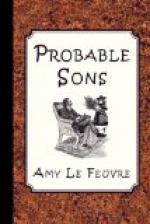It was a cold, gray afternoon. Mrs. Maxwell’s little kitchen was in perfect order. The fire shed flickering lights on the bright dish-covers on the wall, and the blue and white china on the old-fashioned dresser was touched with a ruddy glow. Mrs. Maxwell herself, seated in a wooden rocking-chair, in spotless white apron, was knitting busily as she talked; and Milly on a low stool, the tabby in her arms, with her golden-brown curls in pretty disorder, and her large dark eyes gazing earnestly into the fire, completed the picture.
“Do you like winter, Mrs. Maxwell?” she was asking.
“Well, my dear, I can’t say as I don’t prefer the summer; but there!—the Almighty sends it, and it must be right, and I don’t think folks have a right to grumble and go rushing off to them foreign parts, a-leaving their own country and the weather God gives them, because they say they must have sunshine. I allays thinks they’ve no sunshine in their hearts, or they wouldn’t be so up and down with the weather.”
“I think winter is a very lonely time, Mrs. Maxwell, and I’m so sorry for the trees. I was out this morning with Fritz, and I talked to them and tried to cheer them up. And I think they feel they’re nearly dead, poor things! and they were shivering with cold this morning; they were, really. I told them they would be happy when next summer comes, but they sighed and shook their heads; it’s such a long time to wait, and they have nothing to do—they can only stand still. I was very sad this morning. After I had talked to them, I went down to the plantation at the bottom of the lawn, and on the way I came to a poor dead frog. Fritz sniffed at him, but he didn’t seem to be sorry. I don’t know how he died. I thought perhaps he had stayed out in the cold and got frozen, he felt so very cold. I took him up and buried him, and I wondered if his mother would miss him; and then I went on a little farther, and there were some little bird’s feathers all in a heap on the ground. I felt sure a cruel cat had been eating it up, and I couldn’t help crying, for everything seemed to be dying. And when I got to the plantation I was a little comforted, for the fir-trees looked so comfortable and warm—they hadn’t lost their leaves like the other trees—but do you know, in the middle of them all was a tall, thin, bare tree—he looked so lonely and unhappy, and he was the only one without any leaves.”
“One of those birches, I expect. My man, he said the other day that the fir plantation yonder wanted weeding out.”
“Well, I couldn’t bear to see him so sad, so I crept right in amongst the firs until I got to him, and then I put my arms right round him and cuddled him tight. I told him God would take care of him, and give him a beautiful new green dress next summer; but he seemed to feel the cold, and I expect the other trees aren’t very kind to him. I always think the firs are very stiff and proud. I—I kissed him before I came away. It was a sad morning.”




